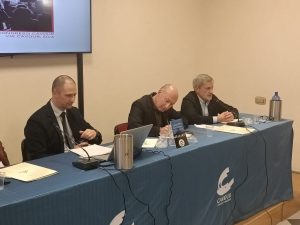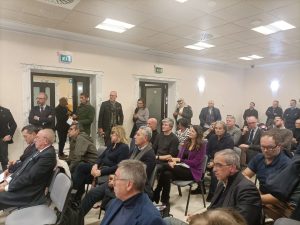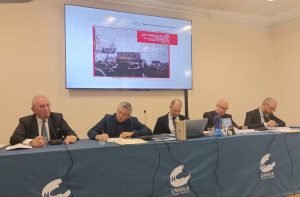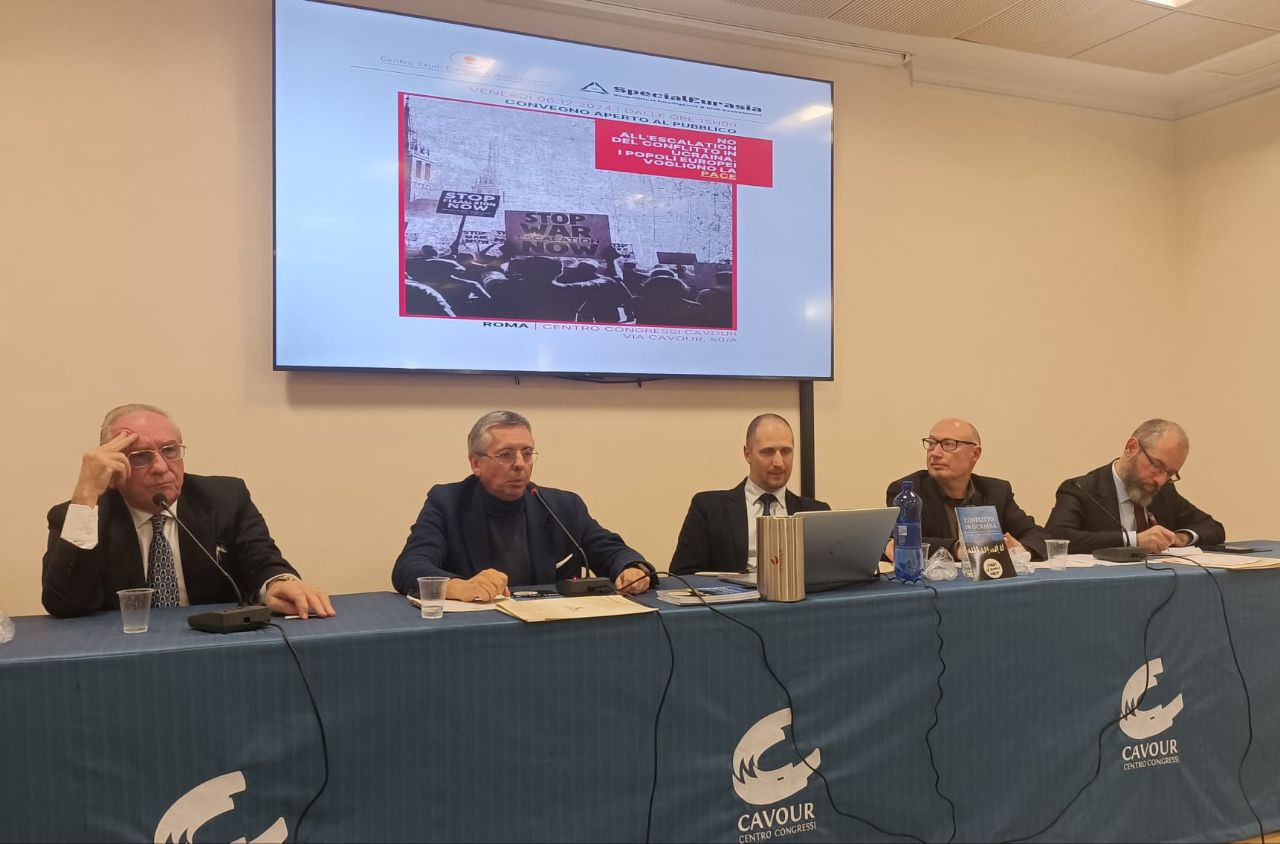The Italian organization CeSEM-Centro Studi Eurasia Mediterraneo organized 6. in December in Rome, an event entitled " Risks of escalation in the conflict in Ukraine: European peoples want peace!
The event brought together an impressive panel of military professionals, political analysts, diplomats and experts in various fields to address the ongoing escalation of the conflict in Ukraine and explore potential solutions. The organizers conceived the event around three key themes: defense, politics and diplomacy. Each section provided a platform to discuss the multifaceted nature of the crisis and its profound implications on Europe and the global order.
At the heart of the event was an urgent call to de-escalate and identify pragmatic strategies to mitigate the devastating humanitarian, economic and geopolitical consequences of the conflict. The discussions resulted in the drafting of a preliminary peace proposal, which reflects the collective insights and perspectives of the participants. The draft offered a framework for a ceasefire and political negotiations, while balancing the security needs of all involved parties and promoting long-term peace and stability in Europe.
Defense panel: Military Analysis and preparedness
The defense panel, moderated by Giuliano Bifolchi, Specialeurasia's research manager, provided an in-depth examination of Europe's military vulnerabilities given the conflict in Ukraine.
General Francesco Cosimato's analysis was a strong criticism of Europe's fragmented defense mechanisms. He advocated for the establishment of a cohesive and independent European military strategy to ensure that Europe could secure its borders and protect its citizens without relying solely on external actors, such as the United States.
General Cosimato highlighted significant deficiencies in Europe's military infrastructure, including outdated artillery systems, a lack of sufficient long-range missile capabilities, and inadequate strategic air transport capacity. These shortcomings, he argues, leave Europe exposed to both conventional and unconventional threats. He noted that while NATO's collective defense in some areas is strong, it has proved insufficient in addressing the dynamic nature of modern warfare, especially with the advent of hybrid warfare tactics.
Lt. Col. Fabio Filomeni extended these concerns, stressing that the nature of warfare had changed significantly in the 21st century. century. Electronic warfare, cyber attacks, and the use of drones and hypersonic missiles are increasingly defining modern conflicts. Filomeni warned that while advanced weapons could alter the balance of forces on the battlefield, technology alone does not guarantee strategic success. He stressed the importance of comprehensive planning, strong training and logistical capabilities. He criticized the European Union's handling of the Ukrainian crisis, noting that Brussels failed to adopt a consistent policy towards Russia. Filomeni described Brussels ' approach as a double standard, on the one hand advocating diplomacy while at the same time supporting militaristic measures that escalated the conflict. This, he argues, exacerbated tensions with Russia and failed to bring about the necessary negotiations to resolve the crisis.

Photo: event entitled " Risks of escalation in the conflict in Ukraine: European peoples want peace!
The discussion took a serious turn when the panel examined the risks of escalating the conflict into a wider war involving NATO. The speakers pointed to Ukraine's possible use of long-range weapons supplied by the US, as well as Russia's deployment of hypersonic missiles as evidence that the stakes are escalating. These weapons not only threaten NATO's defense capabilities, but also underscore the fragility of Europe's security architecture. Experts warned that any further provocation could lead to a direct confrontation between NATO and Russia, with catastrophic consequences for European security.
The panel also discussed the implications of hybrid warfare, highlighting the growing importance of cyber attacks, disinformation campaigns, and other nontraditional forms of warfare. These tactics, they argue, can have a destabilizing impact on critical infrastructure, political systems, and public confidence in government institutions. The speakers stressed the need for a comprehensive security framework that addresses not only conventional military threats but also the developmental nature of hybrid and cyber warfare.
Political panel: Europe's strategic missteps
The political panel, moderated by Stefano Vernole, CeSEM's foreign affairs manager, focused on Europe's political approach to the Ukrainian conflict and criticized its failure to act as a neutral mediator. Both Gianni Alemanno and Roberto Vanazzi have argued that the European Union has failed to assert itself as an independent actor in this crisis, instead opting to unconditionally align with US policy. This alignment, the speakers pointed out, exacerbated Europe's economic vulnerability, especially in the energy sector, ignoring Europe's broader strategic interests.
Gianni Aleman's criticism of Italy's current geopolitical and internal framework emphasizes the complexity and contradictions within its strategic orientation. He argues that the Italian government, especially under Giorgio Meloni and Mario Draghi, has taken an openly pro-Atlantic stance, associating itself with the United States and broader Western interests. This alignment is driven in part by economic considerations, such as maintaining low bond ranges facilitated by favorable ratings from U.S.-based agencies. However, Alemanno argues that the costs of such alignment outweigh the benefits, with Italy experiencing significant industrial and strategic gridlock due to its alienation from Russia. The loss of Russian energy supplies, once the foundation of Europe's industrial growth, has accelerated deindustrialization – a far greater concern than the cyclical recession, given its long-term implications on Italy's economic structure.

Photo: event entitled " Risks of escalation in the conflict in Ukraine: European peoples want peace!
Alemanno further criticizes the ideological basis of Italian politics, which he believes is influenced by the geopolitical goals of the Biden administration and the European Union's Green Deal program. These policies, in his view, represent not only a confrontation with Russia, but also an attack on European economic sovereignty. The future return of Donald Trump as president of the United States raises further uncertainty, with divisions in American political circles over how to address Russia – whether to isolate and defeat it decisively or to engage with it strategically to weaken China-Russia ties. Alemanno suggests that a pragmatic and peaceful approach should prevail, opposing the militaristic tendencies of the US defense and intelligence apparatus.
On the situation in Ukraine, Alemanno foresees a final solution involving a ceasefire, followed by a realistic and non-ideological negotiation process. He advocates the principle of self-determination, proposing internationally supervised referendums in disputed regions such as Donbass to determine their alignment. This approach, he believes, would not only reflect the will of the local population, but would also be the basis for a lasting compromise. Moreover, he stresses the need for Russia to provide guarantees against Ukraine's membership in NATO, a concession crucial to Moscow's strategic security concerns. Alemanno extends this argument to a broader vision, calling for the dissolution of NATO in favor of a truly independent European defense capability, moving the continent away from the militaristic agenda of the Atlantic alliance.
Finally, Alemanno complains about Italy's erosion of international credibility, attributing this to what he perceives as a submissive attitude towards Washington. He argues that its alignment has repeatedly compromised Italy's national interests with NATO-led military interventions, which he believes run counter to the country's strategic priorities. Alemanno criticizes the Meloni government for further diminishing Italy's position, comparing the nation to a "third-class" state and calling for a speedy end to Meloni's term. His vision entails a strategic recalibration in the direction of a more autonomous European political framework, allowing Italy to regain its sovereignty and reassert its importance on the global stage.
Vanaci elaborated on this point, describing the war in Ukraine as part of a broader geopolitical struggle between the West-led us and Russia. This rivalry, he argues, has transformed Ukraine into a proxy battlefield rather than a sovereign nation that can act independently on the global stage. He noted that instead of acting as a mediator, Europe became embroiled in a conflict that served the interests of external powers, neglecting its own economic and political well-being.
The panelists also discussed the detrimental impact of the EU's decision to adopt sanctions on Russia. Alemanno argues that while these sanctions were intended to weaken Russia, they instead hurt European economies by disrupting trade and escalating energy costs. Wanachi added that Europe's decision to stand aside without a clear understanding of the long-term consequences weakened its geopolitical position, diminishing its ability to negotiate from a position of strength.
Diplomatic panel: diplomatic gap
The panel on diplomacy, moderated by Federico de Renzi, a CeSEM analyst, focused on the absence of effective diplomatic engagement in the conflict in Ukraine. Ambassador Bruno Scapini presents the ongoing conflict in Ukraine not as a bilateral issue between Russia and Ukraine, but as a manifestation of a broader geopolitical struggle to involve powerful entities outside the immediate region. He presents the situation as a deliberate effort to destabilize global systems, facilitated by the erosion of traditional values such as family and peace. According to Scapini, this destabilization is driven by the domination of "globalized capital" and the replacement of political management by a technocratic elite. He further argues that the increasing prevalence of military conflicts around the world – over 350 in total, with 250 currently active – reflects the predominance of militarization over disarmament and peace. In his analysis, rhetoric against Russia and China serves as a mechanism for maintaining economic drivers driven by military-industrial interests, making the Ukrainian conflict an ideological battlefield for American elites who seek to undermine the territorial and political sovereignty of their opponents.

Photo: event entitled " Risks of escalation in the conflict in Ukraine: European peoples want peace!
Ambassador Marco Carnelos puts the conflict in the context of the declining hegemony of the West, marking a pivotal moment reminiscent of the Cuban Missile Crisis of 1962. or an introduction to the Second World War in 1938. He argues that the outcome of the war will determine not only Ukraine's fate, but also the global balance of power, arguing that Russia's victory is the least damaging scenario. Carnelos has criticized the provision of long-range weapons to Ukraine, suggesting that they stem from U.S. domestic political calculations under President Biden aimed at limiting his political rivals. He also points out the global debt crisis as a factor that hinders strategic decision-making. Karnelos warns of the lack of viable options for a ceasefire and stresses China's share in the conflict, arguing that a Russian defeat would leave Beijing isolated and compete with the European Union.
Both diplomats highlighted the deep consequences of the conflict on the European geopolitical landscape. Scapini emphasizes the ideological dimension, suggesting that Western narratives against Russia and China strengthen militarization and serve the interests of elite groups. Carnelos, on the other hand, criticizes the increasingly fragmented role of the European Union, describing it as a geographically limited entity shaped by Baltic and Polish influence, with Britain continuing to dictate strategic directions despite its exit from the bloc. He draws historical parallels with moments of existential threat in the 20th century. for a century, arguing that the EU must redefine its strategic posture to avoid escalation and determine a viable border between itself and Russia.
After all, both perspectives converge to the view that the war in Ukraine is an example of the broader systemic crisis of the modern world. They point to the erosion of traditional power structures, the rise of technocracy, and the deepening militarization of international relations. The insights provided by Scapini and Carnelos underscore the critical need to rethink the framework of global governance and address the underlying forces driving these conflicts. Without such efforts, the international system appears ready to further climb into destabilization and confrontation.
Conclusion
The event ended with the formulation of a draft peace proposal designed to resolve the escalation of the conflict in Ukraine and set the stage for long-term stability. The proposal, which represented a concerted effort by the participants, included several key recommendations aimed at de-escalating the conflict and fostering sustainable peace.
Key elements of the proposal:
1. Immediate ceasefire: a call to all parties involved to immediately commit to a ceasefire to prevent further loss of life and destruction.
2. Political agreement negotiations: after the ceasefire, a comprehensive negotiation process should be initiated to resolve the territorial and security problems of both Russia and Ukraine.
3. Ukraine's EU membership with conditions: Ukraine should be allowed to join the European Union, strengthening its economic and political ties with Europe. However, the agreement should explicitly state that Ukraine will not join NATO and will not host NATO military bases on its territory.
4. Lifting sanctions and restoring trade relations: Western sanctions on Russia should be gradually lifted, depending on compliance with the agreement. In parallel, Brussels and Moscow need to explore new trade and economic relations in order to rebuild mutual trust and cooperation.
This framework reflects the consensus among participants that a sustainable solution must balance the legitimate security concerns of all parties while fostering economic interdependence and regional stability. Prioritizing dialogue and pragmatism over confrontation, the proposal offers a path to end the conflict and prevent further escalation. The peace proposal is not just a call for an end to hostilities, but a long-term vision for a more balanced and peaceful Europe.
Source: Center for Geostrategic Studies
10. December 2024.

